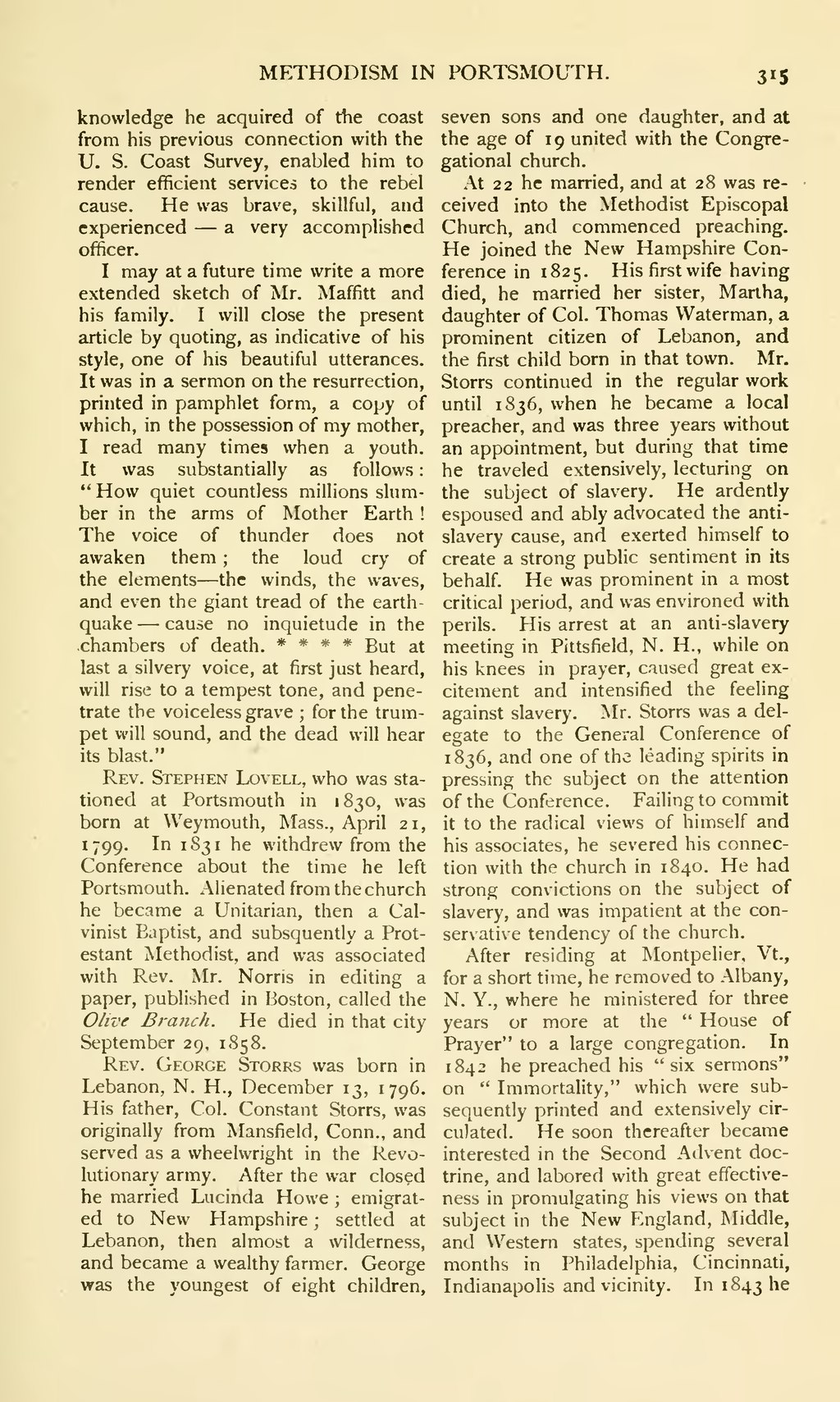METHODISM IN PORTSMOUTH. 315
knowledge he acquired of the coast from his previous connection with the U. S. Coast Survey, enabled him to render efficient services to the rebel cause. He was brave, skillful, and experienced — a very accomplished officer.
I may at a future time write a more extended sketch of Mr. Maffitt and his family. I will close the present article by quoting, as indicative of his style, one of his beautiful utterances. It was in a sermon on the resurrection, printed in pamphlet form, a copy of which, in the possession of my mother, I read many times when a youth. It was substantially as follows: "How quiet countless millions slumber in the arms of Mother Earth! The voice of thunder does not awaken them; the loud cry of the elements — the winds, the waves, and even the giant tread of the earthquake — cause no inquietude in the chambers of death. * * * * But at last a silvery voice, at first just heard, will rise to a tempest tone, and penetrate the voiceless grave; for the trumpet will sound, and the dead will hear its blast."
Rev. Stephen Lovell, who was stationed at Portsmouth in 1830, was born at Weymouth, Mass., April 21, 1799. In 1831 he withdrew from the Conference about the time he left Portsmouth. Alienated from the church he became a Unitarian, then a Calvinist Baptist, and subsquently a Protestant Methodist, and was associated with Rev. Mr. Norris in editing a paper, published in Boston, called the Olive Branch. He died in that city September 29, 1858.
Rev. George Storrs was born in Lebanon, N. H., December 13, 1796. His father, Col. Constant Storrs, was originally from Mansfield, Conn., and served as a wheelwright in the Revolutionary army. After the war closed he married Lucinda Howe; emigrated to New Hampshire; settled at Lebanon, then almost a wilderness, and became a wealthy farmer. George was the youngest of eight children, seven sons and one daughter, and at the age of 19 united with the Congregational church.
At 22 he married, and at 28 was received into the Methodist Episcopal Church, and commenced preaching. He joined the New Hampshire Conference in 1825. His first wife having died, he married her sister, Martha, daughter of Col. Thomas Waterman, a prominent citizen of Lebanon, and the first child born in that town. Mr. Storrs continued in the regular work until 1836, when he became a local preacher, and was three years without an appointment, but during that time he traveled extensively, lecturing on the subject of slavery. He ardently espoused and ably advocated the anti-slavery cause, and exerted himself to create a strong public sentiment in its behalf. He was prominent in a most critical period, and was environed with perils. His arrest at an anti-slavery meeting in Pittsfield, N. H., while on his knees in prayer, caused great excitement and intensified the feeling against slavery. Mr. Storrs was a delegate to the General Conference of 1836, and one of the leading spirits in pressing the subject on the attention of the Conference. Failing to commit it to the radical views of himself and his associates, he severed his connection with the church in 1840. He had strong convictions on the subject of slavery, and was impatient at the conservative tendency of the church.
After residing at Montpelier, Vt, for a short time, he removed to Albany, N. Y., where he ministered for three years or more at the "House of Prayer" to a large congregation. In 1842 he preached his "six sermons" on "Immortality," which were subsequently printed and extensively circulated. He soon thereafter became interested in the Second Advent doctrine, and labored with great effectiveness in promulgating his views on that subject in the New England, Middle, and Western states, spending several months in Philadelphia, Cincinnati, Indianapolis and vicinity. In 1843 he
